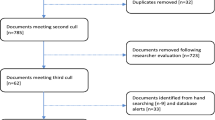Abstract
Science education researchers are concerned with preparing pre-service elementary teachers (PSETs) to teach in ways that support students to learn science in a meaningful way. Preparing elementary teachers to teach science is complicated given that they tend to be generalists and may not have the same experience with science as secondary teachers. During an elementary science methods course, we explored PSETs’ perspectives on the teaching and learning of science via a case study that included four PSETs. Using Frykholm’s (Journal of Curriculum and Supervision 19:125–149, 2004) framework of ‘educative’ and ‘debilitating’ discomfort, we examined PSETs’ approaches to their own science learning and their approaches to science teaching. A theme apparent in PSETs’ perspectives was struggle. We described ways in which struggle was either educative or debilitating for PSETs, both in terms of their own learning and the ways in which they approached teaching. Some PSETs who struggled in their own learning developed learning experiences to engage their students in reform-based science teaching, while some PSETs developed learning experiences that prevented their students from experiencing any sort of struggle in their learning process. The ways in which these students dealt with their own learning struggles mirrored the ways in which they dealt with their struggles to become teachers of reform-based science instruction. Helping PSETs to deal with their feelings of discomfort with science content or ideas about the nature of science learning and teaching promoted by reform documents may be a key issue in developing their willingness to become facilitators of meaningful science learning.
Similar content being viewed by others
References
AAAS. (1993). Benchmarks for science literacy: A project 2061 report. New York: Oxford University Press.
Atwell, N. (1991). Side by side: Essays on teaching to learn. Portsmouth, NH: Heinemann.
Atwood, R., & Atwood, V. (1996). Preservice elementary teachers’ conceptions of the causes of seasons. Journal of Research in Science Teaching, 33(5), 553–563.
Ball, D. L., Lubienski, S. T., & Mewborn, D. S. (2001). Research on teaching mathematics: The unsolved problem of teachers’ mathematical knowledge. In V. Richardson (Ed.), Handbook of research on teaching (4th ed.). New York: Macmillan.
Bingham, C. (2005). The hermeneutics of educational questioning. Educational Philosophy and Theory, 37(4), 553–565.
Bryan, L. A., & Atwater, M. M. (2002). Teacher beliefs and cultural models: a challenge for science teacher preparation programs. Science Education, 86(6), 821–839.
Bryan, L. A., & Tippins, D. (2006). Employing case-based pedagogy within a reflection orientation to elementary science teacher preparation. In K. Appleton (Ed.), Elementary science teacher education: International perspectives on contemporary issues and practice (pp. 299–315). Mahwah: Lawrence Erlbaum Associates, Publishers.
Davis, E. A., & Smithey, J. (2009). Beginning teachers moving toward effective elementary science teaching. Science Education, 93, 745–770.
Davis, E. A., Petish, D., & Smithey, J. (2006). Challenges new science teachers face. Review of Educational Research, 76(4), 607–651.
Duschl, R. A., Schweingruber, H. A., & Shouse, A. W. (Eds.). (2007). Taking science to school: Learning and teaching science in grades K-8. Washington: The National Academies Press.
Frykholm, J. (2004). Teachers’ tolerance for discomfort: Implications for curricular reform in mathematics. Journal of Curriculum and Supervision, 19(2), 125–149.
Glaser, B. G., & Strauss, A. L. (1977). The discovery of grounded theory: Strategies for qualitative research. Chicago, IL: Aldine Transaction. Glaser, B. G., & Strauss, A. L. (1977). The discovery of grounded theory: Strategies for qualitative research. Chicago, IL: Aldine Transaction.
Jones, M. G., Jones, B. D., Hardin, B., Chapman, L., Yarbrough, T., & Davis, M. (1999). The impact of high-stakes testing on teachers and students in North Carolina. Phi Delta Kappan, 81(3), 199–203.
Merriam, S. B. (1998). Qualitative research and case study applications in education. San Francisco: Jossey-Bass.
Metz, K. E. (1995). Reassessment of developmental constraints on children’s science instruction. Review of Educational Research, 65(2), 93–127.
Metz, K. E. (1997). On the complex relationship between cognitive developmental research and children’s science curricula. Review of Educational Research, 67(1), 151–163.
Metz, K. E. (2009). Elementary school teachers as “targets and agents of change”: Teachers’ learning in interaction with reform science curriculum. Science Education, 93, 915–954.
Mikeska, J. N., Anderson, C. W., & Schwarz, C. V. (2009). Principled reasoning about problems of practice. Science Education, 93, 678–686.
Mortimer, E. F., & Scott, P. H. (2003). Meaning making in secondary science classrooms. Philadelphia: McGraw-Hill Education.
NRC. (1996). National science education standards. Washington: The National Academies Press.
Peterson, P. L., McCarthey, S. J., & Elmore, R. F. (1996). Learning from school restructuring. American Educational Research Journal, 33(1), 119–153.
Schwarz, C. V. (2009). Developing preservice elementary teachers’ knowledge and practices through modeling-centered scientific inquiry. Science Education, 93, 720–744.
Smith, C. L., Maclin, D., Houghton, C., & Hennessey, M. G. (2000). Sixth grade students’ epistemologies of science: the impact of school science experiences on epistemological development. Cognition and Instruction, 18(3), 349–422.
Spector, B. S., & Strong, P. N. (2001). The culture of traditional preservice elementary science methods students compared to the culture of science: a dilemma for teacher educators. Journal of Elementary Science Education, 13(1), 1–20.
Villaume, S. K. (2000). The necessity of uncertainty: a case study of language arts reform. Journal of Teacher Education, 51(1), 18–25.
Windschitl, M. (2002). Framing constructivism in practice as the negotiation of dilemmas: an analysis of the conceptual, pedagogical, cultural, and political challenges facing teachers. Review of Educational Research, 72(2), 131–175.
Yin, R. K. (2009). Case study research: Design and methods (4th ed.). Thousand Oaks: Sage.
Zembal-Saul, C. (2009). Learning to teach elementary school science as argument. Science Education, 93, 687–719.
Zembal-Saul, C., Starr, M. L., & Krajcik, J. S. (1999). Constructing a framework for elementary science teaching using pedagogical content knowledge. In J. Gess-Newsome & N. G. Lederman (Eds.), PCK and Science Education. Dordrecht: Kluwer Academic Publishers.
Author information
Authors and Affiliations
Corresponding author
Rights and permissions
About this article
Cite this article
Wilson, R.E., Kittleson, J.M. The Role of Struggle in Pre-Service Elementary Teachers’ Experiences as Students and Approaches to Facilitating Science Learning. Res Sci Educ 42, 709–728 (2012). https://doi.org/10.1007/s11165-011-9221-x
Published:
Issue Date:
DOI: https://doi.org/10.1007/s11165-011-9221-x




